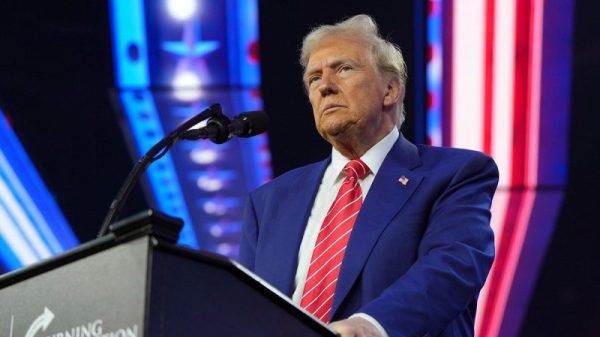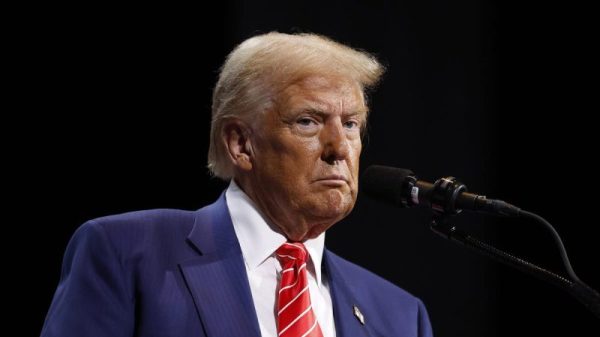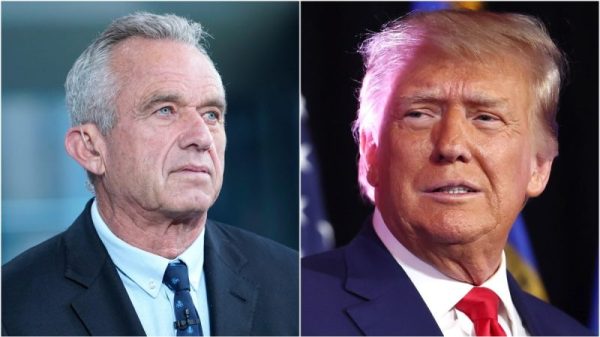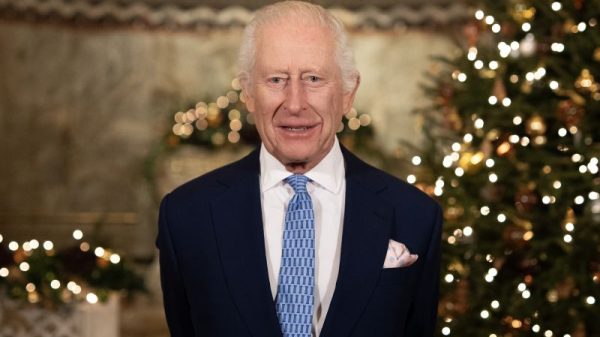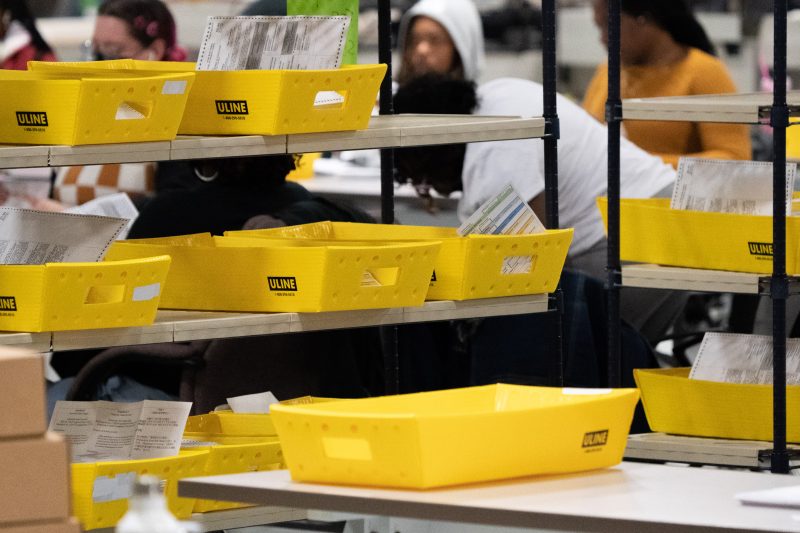A group of Republican congressmen from Pennsylvania have filed a federal lawsuit seeking stricter scrutiny of votes cast by U.S. citizens living abroad, reflecting a new GOP strategy to challenge the eligibility of a group of voters that includes overseas military personnel.
The lawmakers claim in the suit, which was filed this week, that because local election officials in Pennsylvania are not required to verify the identity or eligibility of voters who register overseas, those ballots are vulnerable to fraud. They have asked a federal judge to require officials to set aside completed ballots and not count them until voter eligibility can be determined.
The lawsuit is notable for targeting a group of voters long thought to favor Republicans because of the prevalence of military personnel stationed overseas, but is now seen as more evenly divided or even leaning Democratic. The suit adds to a long list of Republican-backed litigation being fought around the country with just weeks to go before the Nov. 5 election, with much of it aimed at disqualifying mail-in votes or removing ineligible voters from rolls.
Critics pounced on the suit as more evidence that the GOP is laying the groundwork to contest the outcome of the presidential vote if Vice President Kamala Harris defeats former president Donald Trump. They said the suit, if successful, could cause the disqualification of thousands of eligible ballots.
Pennsylvania has sent out 25,000 ballots to Americans abroad so far this year, according to the office of Secretary of State Al Schmidt — a potentially decisive number in the event of a close election. In 2020, Joe Biden won both Arizona and Georgia by less than half that number. Pennsylvania is widely seen as among the most competitive states this year.
In the lawsuit, six of Pennsylvania’s eight Republican congressmen argue that state law makes it possible for ineligible individuals to “register to vote without verification of identity or eligibility but receive a ballot by email and then vote a ballot without providing identification at any step in the process.” As a result, they say, “the ultimate tally of the votes may not accurately reflect the legal results which could affect a close Congressional election.”
The suit claims that Pennsylvania’s rules around overseas voting violate state and federal law, but critics say that is not true. Federal law defers to states to establish election rules, and it also specifically calls for the process of overseas voting to not be unduly burdensome.
“The policies and procedures around overseas voting have been known for years, if not decades,” said David Becker, who leads the nonpartisan Center for Election Innovation & Research, which promotes trust in U.S. elections. “For members of Congress to file a lawsuit four weeks before the presidential election, about a law that is four decades old, is disturbing, and could put the right to vote at risk for many members of the military.”
Pennsylvania law governing overseas voting, which has been in place for decades, requires Americans abroad to be previous residents of Pennsylvania and to attest to their eligibility.
“This lawsuit was filed two weeks after counties started mailing ballots to military and overseas voters, and it baselessly challenges Pennsylvania law, which provides clear procedures for processing applications by overseas voters,” said Amy Gulli, a spokeswoman for the Pennsylvania Department of State. “Our service members deserve to have their votes counted.”
Others said the case amounts to a fishing expedition given the lack of documentation of illegal exploitation of overseas voting. The suit sows further doubt and mistrust in the legitimacy of U.S. elections despite the lack of evidence of widespread fraud, heightening the possibility of civil unrest and even violence should Trump lose, the critics said.
“We’re definitely seeing a series of desperate and legally questionable attempts to suppress the vote, and I think, for the sake of overseas military voters and all overseas voters, we definitely hope that they fail,” said Philip Hensley-Robin, executive director of Common Cause Pennsylvania, a nonpartisan government watchdog.
A lawyer for the Republican lawmakers, Erick Kaardal, was involved in several cases in 2020 challenging the certification of Biden’s win. He did not respond to a request for comment.
The ballots in question are governed by a federal law known as the Uniform and Overseas Citizens Absentee Voting Act, which requires states to allow eligible Americans living abroad, including military personnel, to vote in federal elections. Although many states require overseas voters to provide identification such as a driver’s license or passport, Pennsylvania does not.
Overseas voting has traditionally been supported by both Republicans and Democrats because of how many uniformed Americans use it. Even in 2020, when then-President Donald Trump attempted to discredit domestic absentee balloting in the midst of the coronavirus pandemic, he and his allies did not attack overseas voting.
“That’s when everyone thought overseas meant military. Not true,” Cleta Mitchell, one of the lawyers who helped Trump challenge his defeat four years ago, said in a text message. “Approx 63% of [overseas] ballots in 2020 were nonmilitary.”
Mitchell said she worked with local leaders to prepare the litigation in Pennsylvania after learning that the state doesn’t verify the identify of overseas voters. She began examining the issue in 2021 and stepped up the effort when Biden issued an executive order requiring the Defense Department to facilitate voting among both military and nonmilitary Americans abroad.
The civilian makeup of overseas voters is a problem, Mitchell said, because she believes tax dollars are being used for “partisan” voter outreach. In addition, she said many states don’t follow their own laws regarding voter verification. Someone in the United States could easily request an overseas ballot in these “very insecure” systems, she said.
Elon Musk has amplified claims on X, the social media platform he owns, about the security of overseas voting. Late last week, Musk shared a post about Democrats’ “plan to steal elections using ‘overseas’ ballots,” adding: “Is this for real?” Two days later, Trump shared Musk’s post and wrote: “Lawyers at RNC — STOP THIS FRAUD, NOW!!!”
The Republican National Committee filed a lawsuit in North Carolina last week challenging the eligibility of a small subset of overseas voters. On Tuesday, national Republicans filed a similar lawsuit in Michigan. The two are among a handful of states that allow people born overseas to parents who were previously legal residents to cast ballots, too.
Democrats think Republicans are now focused on overseas voting in part because the proliferation of remote workers abroad and the drawdowns of overseas military personnel may have made the makeup of the voting group more Democratic.
“Jan. 6 taught us that there is no low to how far people will go to try to overturn an election, and we’re seeing that play out now,” said Michigan Secretary of State Jocelyn Benson (D), referring to the violent attack on the U.S. Capitol in 2021 intended to thwart the final step of certifying Biden’s victory. “These are duplicative lawsuits all designed to deplete voter confidence and set up a scenario where the will of the people can be disregarded.”
Benson said the number of voters born overseas who have never lived stateside is probably tiny, but the office does not track the data. It would be impossible to segregate those ballots to discard them, she said.
There is little data showing how overseas residents tend to vote, but numerous election officials and activists said they believe the numbers skew Democratic.
Martha McDevitt-Pugh, chairwoman of Democrats Abroad and a resident of the Netherlands, said overseas voters cast 18,000 ballots in Georgia and roughly the same number in Arizona in the 2020 election — far more than the overall margin of victory for Biden in both states. She said she suspects Republicans have studied those numbers and realized that overseas votes can make a difference.
“They’re looking for a way to intimidate voters as well as find a way to challenge the election afterward,” she said.
Voting-related litigation has ramped up this fall, with just weeks to go before the election. Kyle Miller, Pennsylvania policy strategist for Protect Democracy, said Republicans are filing “zombie lawsuits” that are unlikely to go anywhere, but act as placeholders for later litigation.
“So the concern here is not necessarily that they’re going to win on their merits prior to the election, but then they are going to be used to provoke elective diversion efforts on the back end,” Miller said.
The six congressmen who brought the Pennsylvania case are: Guy Reschenthaler, Dan Meuser, Glenn Thompson, Lloyd Smucker, Mike Kelly and Scott Perry. All voted not to accept Pennsylvania’s electoral votes on Jan. 6, 2021, despite the lack of evidence of widespread fraud. Perry’s phone was seized by the FBI during the Justice Department’s investigation into the attempt to activate Trump’s presidential electors in states that Biden won to overturn the 2020 presidential election.
All are seeking reelection this year.
Pennsylvania Fair Elections is also a plaintiff in the case.
In a statement, Meuser said: “We must ensure that the votes of our brave service members and overseas citizens are protected from dilution and manipulation. Every illegal vote cancels out the legal vote of an American citizen.”
Federal law requires election officials to ensure that valid overseas ballots are “duly counted,” requiring only that voters submit a postcard each federal election cycle attesting to their eligibility and including a signed oath with their ballot. Pennsylvania statutes say that “a qualified absentee elector shall not be required to provide proof of identification” for overseas ballots.












